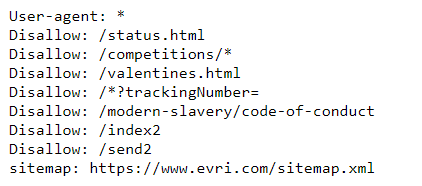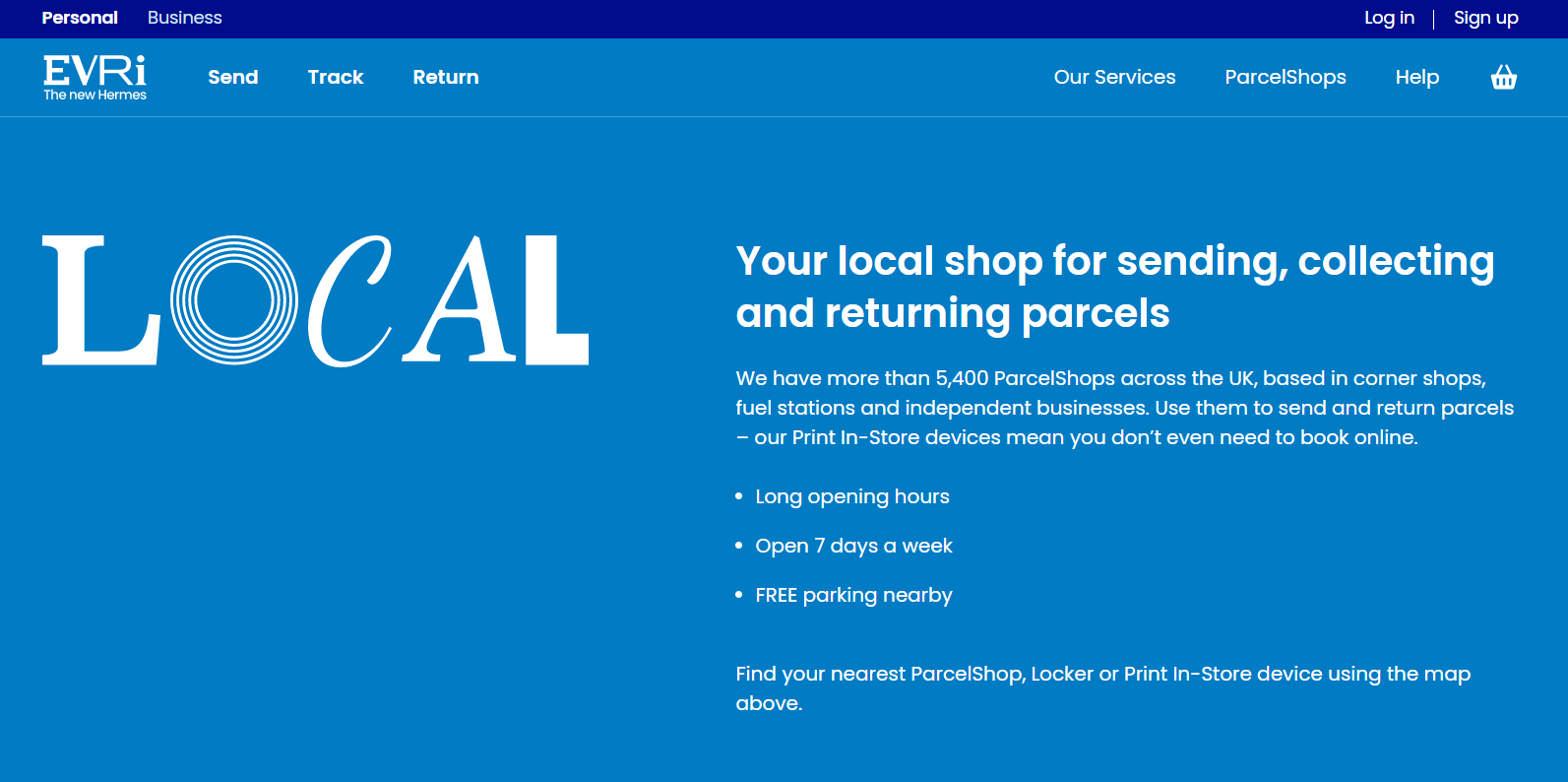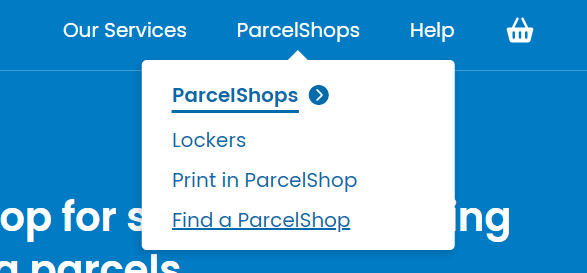Taking a look at Hermes’ domain migration to Evri
As of March 14th, Hermes has migrated their www.myhermes.co.uk domain to https://www.evri.com/ due to a major rebrand.
Migrations can always be a tense time for sites, since the risk of damage can range from minimal to catastrophic, depending on the type of migration in play.
With the Hermes to Evri migration being both a brand and domain migration, they are likely dealing with higher-than-average risks, since the migration relies on adoption from both bots and users.
To further add to the risk, the new site has also undergone some structural changes, meaning simple like-for-like redirects are out of the window. While this isn’t inherently problematic, it does open them up to a higher potential for things to go wrong if redirect mapping is not properly completed.
We’ve broken down some of the things Evri has done right, and some of the things that might make it harder for them to regain their footing in search results.
What they got right
301 redirects
We tested a number of www.myhermes.co.uk URLs to see how they were behaving, and can happily see 301 redirects are in place to the new Evri domain.
As far as we can see, these redirects are primarily implemented well – with the majority leveraging only one redirect. There were a few instances of redirect chains containing 2-3 redirects, but nothing higher. This means it’s likely search engines will be able to properly attribute link equity to the new domain when they encounter these redirects.
Robots.txt
The robots.txt on the now-defunct Hermes domain is still returning a 200 status code. While it may seem counter-intuitive, this approach is actually preferable as it allows bots to still see the linked sitemap for the old URLs (more on this later).
Notifying users
Via the Wayback Machine, we can see that Hermes had a banner notice about the upcoming migration, first recorded by the web archive on March 1st. This is great, as it helps reduce confusion from returning customers.
The banner notice linked to a post which can also be seen on the Wayback Machine, and covers:
- An introduction to the fact there will be a new website
- The affected domains and subdomains
- Instructions for continuing use of business for both personal and business
An updated version of the post (dated March 11th) can be found on the new site and has added an introduction to the new name and anti-phishing guidance, along with the notice that the legacy sites are now out of commission.
Title tags containing notification of brand name change
A number of the title tags seen on the new Evri site contain a reference to the change from the Hermes name.
This is great for users, as it helps to confirm to them Evri is what they were looking for if they searched for Hermes. It should also help search engines make a connection between the two brands.
Mistakes
Legacy sitemap redirection
While the old sitemap is still linked in the old Hermes robots.txt, it actually now redirects to a sitemap address on the new domain which, in turn, redirects to the homepage.
Unless a migration sitemap has been submitted via Google Search Console, it is likely this implementation will increase the time it takes for Google to adopt the new migration, since it will no longer have a list of myhermes.co.uk URLs and cannot rely on internal linking for link discovery due to the redirects in place.
It’s also worth noting that, while submission to Google Search Console would work for Google, it would not cover other bots – meaning that Hermes/Evri would need to submit their migration sitemap via the webmaster tools for all search engines used by their customers (e.g. Bing Webmaster Tools).
Hopefully, a migration sitemap has been submitted to Google Search Console and Bing Webmaster Tools, rendering this a relatively moot point.
New sitemap redirection
As mentioned above, the new Evri sitemap redirects to the homepage. This is true for the version linked in robots.txt, as well as some other common sitemap name variations we tried (such as sitemap_index.xml and sitemapindex.xml).


This is potentially going to make it harder for Google to crawl and index Evri’s pages from a most-valuable first approach – since we’re not telling Google which URLs are the most valuable.
Note: Evri may be using the Google Search Console “request submission” feature for their absolutely critical pages, however with 9,000+ Hermes URLs to migrate it is unlikely they’d be able to do this for many.
Content and links rely on JavaScript to be seen
The new site is built with Nuxt.js and relies on JavaScript execution for content to be seen by bots. As far as we can tell (through testing with a spoofed Googlebot user agent) there is no pre-rendering in place to mitigate this.
Evri is relying on Google to properly render all site content with JavaScript. This wouldn’t be an issue if it were just a couple of URLs, but in the context of a full migration (at least for the main www.myhermes.co.uk subdomain), it means some content is likely to go unseen for a while, affecting the ranking potential of those pages. The majority of links also appear to rely on JavaScript rendering, meaning link equity may not be properly passed around the site until search engines are able to see them.
This issue is compounded by the suspected lack of a sitemap, since search engines won’t know which URLs to prioritise for crawling, meaning critical pages may not be rendered properly for a while. This is also a huge problem for link discovery and indexation since they are unable to rely on internal linking for URLs to be discovered and don’t have a sitemap to fall back on – in which case a number of pages are likely to remain out of the indexed for a significant period of time.
Maintaining messaging about the new brand
While pre-migration messaging was covered well, coverage since the migration has been less successful.
The new logo image in the header navigation does state that Evri is “the new Hermes”. aside from this, however, the homepage shows no indication of the move. Ideally we’d like to see a link to the New Site article – possibly in the form of another header banner.
What’s interesting about this migration?
This appears to be a phased migration, implemented in several steps, with the main myhermes.co.uk domain migrating on the 14th and classic.myhermes.co.uk set to migrate on the 28th (according to the blog post we dug up on the Wayback Machine). Other subdomains, such as psf.myhermes.co.uk, appear to still be live. However, the migration date for these is currently unclear.
Phased migrations can be useful when site verticals are split across multiple technologies or when vertical departments are notably siloed, as they remove a lot of the inter-departmental dependencies – i.e. the department behind one vertical does not need to rely on all other departments meeting their deadlines. It can be easier to find and amend bugs when dealing with a smaller dataset.
However, partial migrations can be tricky, since there is no single switch from which to measure impact. Additionally, in a migration such as this, verticals may be live on the new site prior to their actual migration date, creating the potential for duplicate content.
For an example of a duplicate content situation, we can take a look at the ParcelShop directory on psf.myhermes.co.uk, which is still returning a 200 status code, while the new Evri domain also has a ParcelShop page (although, at the time of writing, it appears to still be a work in progress and missing the functionality of a map).

This is further complicated by the internal linking of the rest of the new site (including header navigation), which points to the Evri version as the location users should go to, despite it being currently under development.

Final thoughts
The migration appears to have a lot of the basics right, with the new site being available to bots and the old site having 301 redirects in place. However, with some of the issues discussed above, we would expect to see the site take a hit in indexed pages, as well as a decrease in ranking potential for the pages that do get indexed.
Overall, we wish Evri the best of luck with their new site!